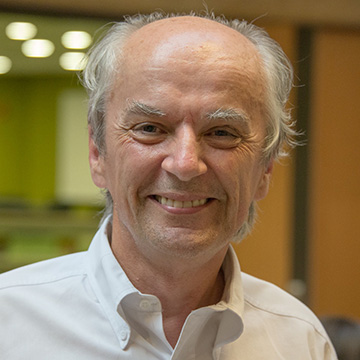The fall quarter has begun, and Eamonn Callan, the Pigott Family School of Education Professor and associate dean for student affairs, offered some advice to those students who are about to start their studies at the Stanford Graduate School of Education.

Callan welcomed new students to the GSE on the morning of Sept. 17 at the first of two days of orientation. What follows is an excerpt adapted from his remarks.
One thing I have to think about long and hard in my job is what do students really need if they are to flourish here. I don’t mean survive. But what do they need if they are to fully achieve their scholarly potential. Everyone who is admitted here has extraordinary academic potential. Otherwise we would have said, No thanks, you’re not coming here. So what do you need to realize that potential?
I want to talk about confidence and humility. I think they are fully compatible attributes, I don’t think there is any tension between them, and I will speak of them as such.
First of all, confidence.
I was the first in my family to go to college and only the second to finish high school. I went to a university in Ireland far less exalted than Stanford University, and when I got there I felt I was in a place where I didn’t really belong. I went to train as an educational researcher in Canada at a university that many of you would have never heard of, and when I got there I felt I was in over my head. And later, in my mid 40s, I came to work at Stanford University: When I was interviewed for a job here, it was the first time I had laid foot in an elite educational research institution in the U.S.A. By the time I was 45 and was eligible for a full professorship at Stanford, my ego was rather more robust than it had been, but at the same time — especially during that first year —the thought occurred to me fairly often, “You know I wonder if I had just had an amazing stroke of luck, and they had hired the wrong Eamonn Callan. Maybe there was another guy with the same name whom they really wanted to hire and they got me instead.”
Those thoughts were faint, and they weren’t disabling when I came here, but I know — not just through my own experience working with students but also through research that’s been done among students at Stanford and comparable institutions — that many people who come here and are extremely talented are just haunted by the thought that they don’t really belong here, that some mistake was made. You go to classes where you can’t find the courage to speak up and the folks who do speak up are amazingly fluent and eloquent and their polysyllabic virtuosity just dazzles you, right? And so you don’t say a word.
Now I can’t give you an easy solution to overcoming a lack of confidence. If indeed it becomes a serious problem for you, don’t be afraid to seek help in counseling. I would also encourage you to be forthright about it, not to hide it. Because I can assure you that any four or five people whom you might talk to about this, at least a couple will say, “Yes, I know what you mean, and I feel exactly the same way about being here.”
It’s precisely because we’re so reticent to talk about this problem that people are burdened with the illusion that it’s just them. . . .
Humility.
The hardest thing in the academic life is not the grueling hours you put in to write the best paper you can. The hardest thing is to accept criticism and make the most of it.
Learning in the academic life is really all about reaching out to others to receive criticism; not running away from it, but pondering it, and saying to yourself, “What can I learn from this?” A common first reaction to criticism is to say, “No, you’ve misunderstood me, you’ve got it wrong. What I was really saying was . . . ”
This is something that I’ve become mindful of, as I’ve grown older. Very often if you look at academic criticism and counter-criticism, you’ll find that people are misunderstanding each other, and they are talking past each other. So it’s not surprising if somebody reads your prose, then misunderstands it and criticizes it accordingly.
But even when one is misunderstood, there will be insight in there to help you to do it better the next time, to improve that product which you have shared with a peer or which you have submitted in class.
If I think of the tiny number of students whom I have known over the years who have not finished their degrees because of academic difficulties, I would say that in the lion’s share of cases, these have been people who could not learn from criticism. . . . I’ve been at this game now for decades, as you can see, and I value criticism, but I still find it emotionally hard to take. I want to be right. I don’t like seeing that I got it wrong, and that somebody was smart enough to see where I had gone wrong. It’s always hard to take. But that, too, is something inside yourself you have to fight.
There’s another thing I’ve learned. I think the lack of humility is often a mask for the lack of confidence. There’s a connection between learning to be truly confident and learning to be strong enough to open yourselves to criticism. I know that you can do that, but sometimes it’s helpful to have a reminder.